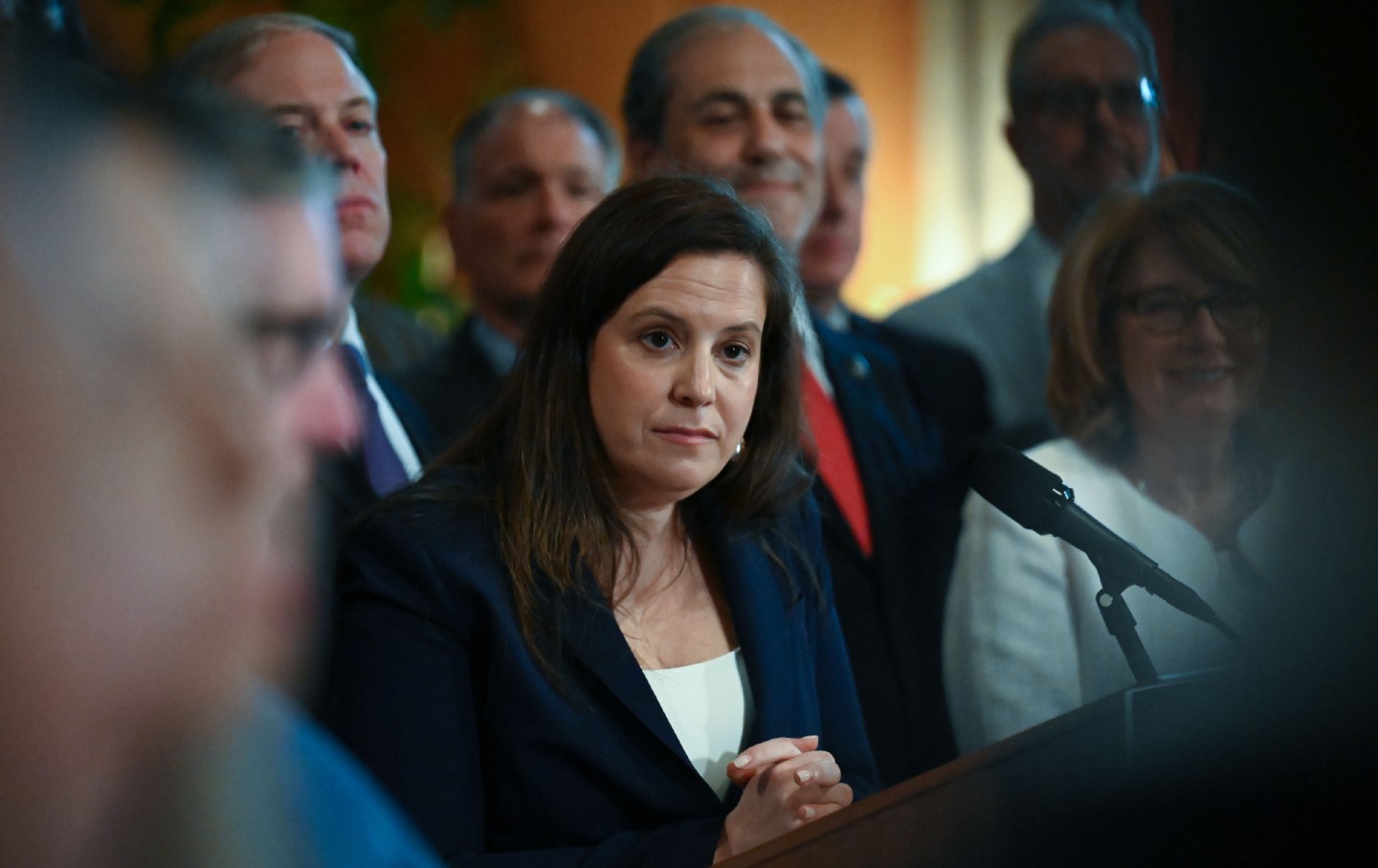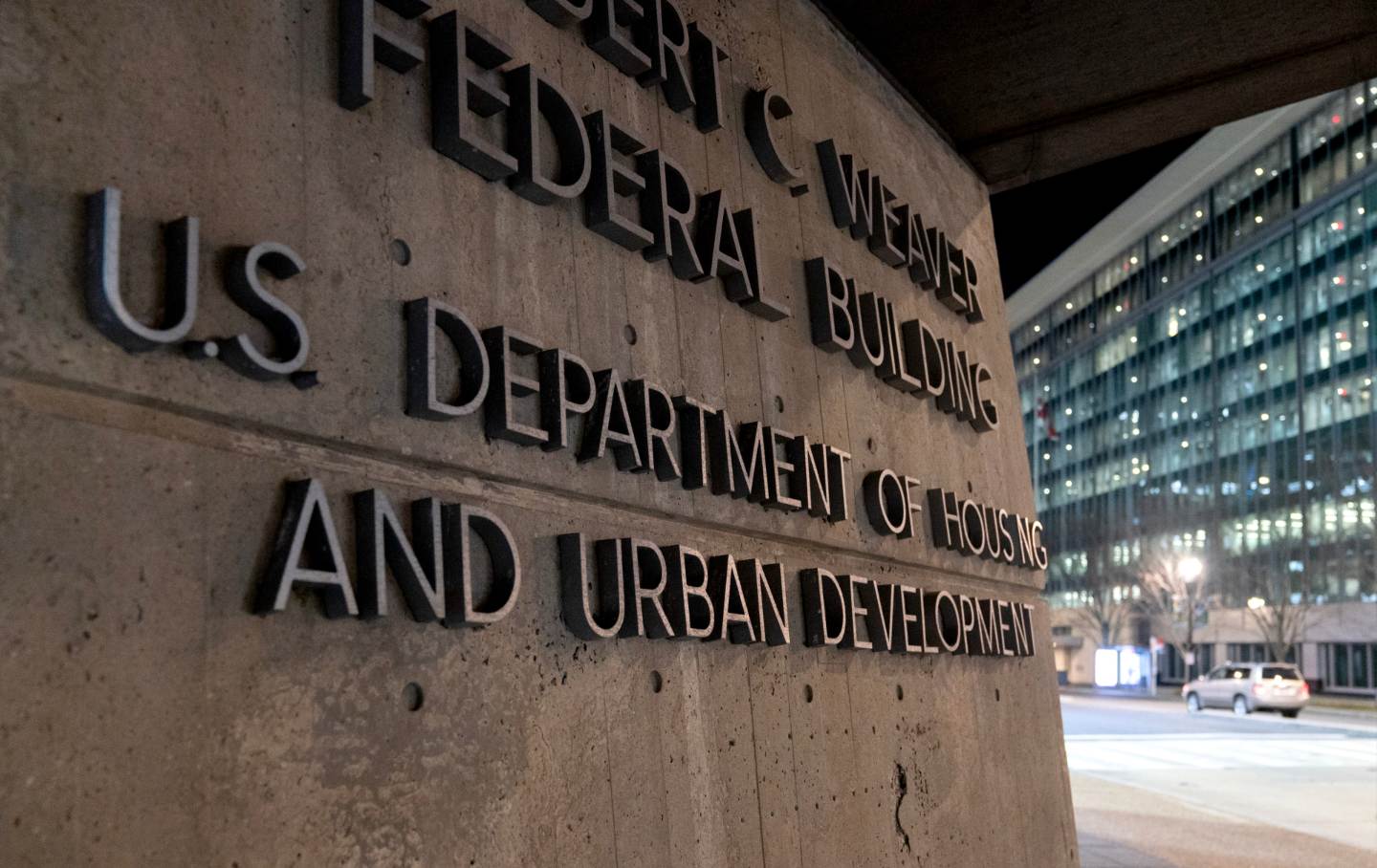Iowa Republicans Decide They Want to Lose Again With Donald Trump
The former president won the first caucus state. But a striking one-third of caucus-goers told pollsters that a convicted Donald Trump would be unfit for office.

Donald Trump after speaking at a caucus night party in Des Moines, Iowa, Monday, January 15, 2024.
(Andrew Harnik / AP)Dubuque, Iowa—“This is the earliest I can remember ever calling such a thing,” declared CNN anchor Jake Tapper, as the network announced just minutes into the count of Iowa Republican caucus votes that Donald Trump would be the winner with around 50 percent of the vote. The former president, said Tapper, was “pulling off a huge early victory in his bid to return to the White House…easily defeating his top opponents, Ron DeSantis and Nikki Haley, who are now in a high-stakes fight for second place.”
True enough.
But the most compelling news of the night was not that Iowa Republicans had—on what locals were labeling “the coldest caucus night in history”—done what everyone expected them to do, by choosing to further elevate the front-runner in the race for the party nod.
What mattered more was a statistic found submerged in the entrance poll data collected from caucus-goers.
“Few GOP caucus goers express concerns about the criminal charges Trump currently faces,” announced a review of an entrance poll that surveyed Iowa Republicans on caucus night. “Roughly 6 in 10 say that they’d consider Trump fit for the presidency if he were to be convicted of a crime, with only about one-third saying they wouldn’t see him as fit in that circumstance.”
Talk about burying the headline!
Yes, 63 percent of Iowa’s very conservative and majority-MAGA Republicans said they would vote in November for a convicted felon. That’s very much in character for self-proclaimed MAGA Republicans, whose enthusiasm for Donald Trump knows no bounds. But a striking 32 percent of Iowa Republicans who were surveyed said Trump—who faces 91 indictments in a string of criminal trials that could begin as early as March—would, if he were convicted of a crime before the election, be “unfit for office.”
Trump is definitely on track to win the Republican nomination. Iowa confirmed that reality, giving the loser of the 2020 presidential race a majority of all votes cast on caucus night. But the caucuses suffered from an enthusiasm gap; turnout was the lowest since 2000. And there is evidence to suggest that the gap could grow as Trump’s legal troubles come into focus.
What happens if Trump is convicted before November on one or more of the many charges he currently faces? Haley and another remaining Republican contender, former Arkansas governor Asa Hutchinson, have sought to make an electability argument based on Trump’s troubles—along with widespread concerns about his record of harming rather than helping down-ballot Republican candidates, as happened in 2018, 2020, 2022, and the 2023 off-year election.
The points made by Haley and Hutchinson are well taken, as the Iowa entrance poll suggests.
A conviction is not beyond the realm of possibility, particularly when juries will have 91 separate chances to find Trump guilty. (The former president faces four felony counts in Washington, D.C., for seeking to overturn the results of the 2020 election, 13 felony counts in Georgia for election interference, 34 felony counts in New York for making hush-money payments, and 40 counts in Florida for mishandling classified documents.)
Pundits and Trump allies have long assumed that very few Republicans would care if their nominee headed into the November competition as a convicted felon.
But the entrance poll result indicates that a convicted Donald Trump would be seen as unfit by roughly one-third of Republican voters—in Iowa and, it’s reasonable to presume, nationally. Trump won’t lose all of them. Party loyalty is a powerful force, and there are plenty of Republicans who will ultimately vote for a candidate they consider unfit simply because there’s an “R” next to his name.
But if the Republican nominee in what’s expected to be a very close fall contest loses a significant portion of Republican voters, that nominee is in serious trouble.
This provides an opening for President Biden, who is all but certain to be the Democratic nominee. Referring to the 32 percent of voters who indicated that they would see a convicted Trump as “unfit,” veteran Democratic consultant David Axelrod said that, for the Biden campaign, “it creates a universe of voters I want to talk to.”
Popular
“swipe left below to view more authors”Swipe →What voters might Biden’s team want to talk to? Look at the support in Iowa for Haley, the former UN ambassador and South Carolina governor whose surging campaign attracted roughly 20 percent of the Republican caucus vote on Monday night, almost displacing Florida Governor Ron DeSantis in a state that DeSantis had made the focus of his 2024 bid. The latest NBC News/Des Moines Register poll, released one day before the caucuses, found that almost half of Haley’s voters would abandon a Republican ticket led by Trump. A review of the polling data by The Hill noted that “43 percent of Haley backers in the state said they would vote for Biden if Trump is the GOP nominee, while 23 percent say they would vote for the former president. Eight percent said they would vote for independent candidate Robert F. Kennedy Jr.” Among the overall pool of Republican caucus-goers, according to the NBC News/Des Moines Register poll, 11 percent said that, in a Trump-Biden race, they’d back Biden.
That’s without a conviction.
With a conviction, Trump’s got an even bigger problem. The Iowa entrance poll points to that reality. And the caucus-night survey is not an outlier. A Washington Post review in December of national polls that had explored the conviction question—including a New York Times/Siena College survey, a Reuters/Ipsos poll, a Quinnipiac University poll, a Wall Street Journal poll, and a recent survey of Tennessee voters by Vanderbilt University—determined that, while “a huge number of Trump backers would stick with him even if he is a felon,” the polls “also show that a conviction could turn off a group of voters that is significant enough to effectively lose the race for Trump.”
Disobey authoritarians, support The Nation
Over the past year you’ve read Nation writers like Elie Mystal, Kaveh Akbar, John Nichols, Joan Walsh, Bryce Covert, Dave Zirin, Jeet Heer, Michael T. Klare, Katha Pollitt, Amy Littlefield, Gregg Gonsalves, and Sasha Abramsky take on the Trump family’s corruption, set the record straight about Robert F. Kennedy Jr.’s catastrophic Make America Healthy Again movement, survey the fallout and human cost of the DOGE wrecking ball, anticipate the Supreme Court’s dangerous antidemocratic rulings, and amplify successful tactics of resistance on the streets and in Congress.
We publish these stories because when members of our communities are being abducted, household debt is climbing, and AI data centers are causing water and electricity shortages, we have a duty as journalists to do all we can to inform the public.
In 2026, our aim is to do more than ever before—but we need your support to make that happen.
Through December 31, a generous donor will match all donations up to $75,000. That means that your contribution will be doubled, dollar for dollar. If we hit the full match, we’ll be starting 2026 with $150,000 to invest in the stories that impact real people’s lives—the kinds of stories that billionaire-owned, corporate-backed outlets aren’t covering.
With your support, our team will publish major stories that the president and his allies won’t want you to read. We’ll cover the emerging military-tech industrial complex and matters of war, peace, and surveillance, as well as the affordability crisis, hunger, housing, healthcare, the environment, attacks on reproductive rights, and much more. At the same time, we’ll imagine alternatives to Trumpian rule and uplift efforts to create a better world, here and now.
While your gift has twice the impact, I’m asking you to support The Nation with a donation today. You’ll empower the journalists, editors, and fact-checkers best equipped to hold this authoritarian administration to account.
I hope you won’t miss this moment—donate to The Nation today.
Onward,
Katrina vanden Heuvel
Editor and publisher, The Nation
More from The Nation

Islamophobic Elites Lied to Destroy the Life of a Palestinian Brown Student Islamophobic Elites Lied to Destroy the Life of a Palestinian Brown Student
Plutocrats, pundits, and government officials joined together in a racist smear campaign against a queer Palestinian student at Brown University.

Recent Democratic Victories Have Republicans Running Scared Recent Democratic Victories Have Republicans Running Scared
Elise Stefanik is just the latest top Republican deciding against running in the 2026 midterms.

Pirate Trump Pirate Trump
Donald Trump escalates Caribbean tensions with vessel attacks near Venezuela.

Trump’s “Warrior Dividend” Might Be His Scariest Idea Yet Trump’s “Warrior Dividend” Might Be His Scariest Idea Yet
This week’s “Elie v. US” explores the authoritarian threat beneath Trump’s bonuses for military families. Plus, a case for getting rid of the Second Amendment.

HUD Is Refusing to Enforce Anti-Discrimination Law—and Won’t Let Anyone Else Do It, Either HUD Is Refusing to Enforce Anti-Discrimination Law—and Won’t Let Anyone Else Do It, Either
The initial chaos of layoffs has been followed by a concerted effort by the Trump administration to halt the enforcement of the Fair Housing Act.



